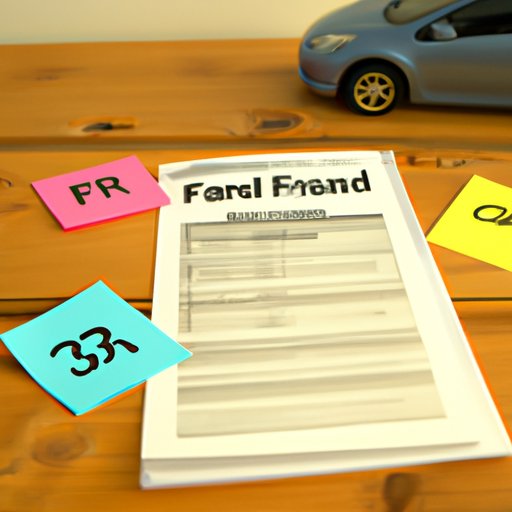Introduction
Selling a financed car to a third party is a relatively straightforward process involving the transfer of ownership from one party to another. When a car is sold with an existing loan on it, however, there are a few extra steps that must be taken in order to ensure the sale is completed properly. The purpose of this article is to explain the process of selling a financed car to a third party, as well as provide tips for maximizing return when doing so.
Explaining the Process of Selling a Financed Car to a Third Party
When selling a car with an existing loan on it to a third party, there are several steps that must be taken in order to complete the transaction. First, the seller should contact their lienholder (the financial institution that holds the loan) to request a payoff amount. This number will include any remaining balance on the loan plus any applicable fees. Once the amount is established, the seller can then begin the process of transferring ownership to the new buyer.
In addition to the steps outlined above, there are also a few legal and financial considerations that must be taken into account when selling a financed car to a third party. For example, the seller must make sure that the lienholder is paid in full prior to transferring ownership to the new buyer. Additionally, the seller should also be aware of any state laws that may apply to the sale. Finally, it is important to remember that the buyer may need to take out a new loan in order to purchase the car, which could affect the overall cost of the transaction.

Examples of How to Successfully Complete the Paperwork
Once the buyer and seller have agreed to the terms of the sale, the next step is to complete all of the necessary paperwork. Depending on the state, this may include a bill of sale, title transfer, and other documents required by the DMV. It is important to note that the paperwork must be completed accurately in order to avoid any delays or complications during the process.
The first step in completing the paperwork is to gather all of the necessary documents. This includes the vehicle’s title, lien release form, bill of sale, and any other documents required by the DMV. Once these documents have been collected, the seller can then move on to understanding the terms of the loan. This includes the total payoff amount, the interest rate, and any other associated fees. Finally, the seller must transfer the title to the new buyer, which is typically done at the DMV.
Potential Risks Associated with Selling a Financed Car to a Third Party
While selling a financed car to a third party can be a great way to make some extra money, there are also a few potential risks that must be considered. The most common risk is that the lienholder may not be paid in full. If this happens, the seller may be held responsible for any unpaid balance on the loan. Additionally, there is also the risk that the buyer may default on the payments, leaving the seller liable for any repossession costs.
Another potential risk is that the buyer may not be able to secure financing in order to purchase the car. If this happens, the seller may be left without payment for the car and may have to resort to other methods of collecting the money owed. Finally, it is important to note that the seller may also be held liable if the buyer does not register the car in their name after the sale is complete.

Tips on How to Maximize Return When Selling a Financed Car
When selling a financed car to a third party, it is important to maximize the return on the sale. The first step is to establish a fair market value for the vehicle. This can be done by researching similar vehicles in the area and getting an appraisal from a qualified mechanic. Once the value has been established, the seller should negotiate appropriately in order to get the best price for the car.
Additionally, offering financing options to the buyer can also help to increase the return on the sale. This can be done by offering an extended warranty or a lower interest rate on the loan. Finally, it is important to remember to include any additional fees associated with the sale, such as taxes, registration, or title transfer fees.

Benefits of Selling a Financed Car to a Third Party
There are many benefits to selling a financed car to a third party. The most obvious is that it allows the seller to make more money than they would if they were to simply trade in the car. Additionally, it is often easier to find a buyer for a financed car, as the buyer does not need to secure financing in order to purchase the vehicle. Finally, selling a financed car to a third party can often result in a quicker sale, as the paperwork and transfer process can be completed in a matter of days.
Conclusion
Selling a financed car to a third party can be a great way to make some extra money. In order to do so successfully, it is important to understand the process, legal considerations, paperwork requirements, potential risks, and tips for maximizing return. By following these guidelines, sellers can ensure that the sale is completed properly and that they receive the maximum return on their investment.
In conclusion, selling a financed car to a third party can be a great way to make some extra money. With the right preparation and understanding of the process, sellers can maximize the return on their investment while minimizing their potential risks.
(Note: Is this article not meeting your expectations? Do you have knowledge or insights to share? Unlock new opportunities and expand your reach by joining our authors team. Click Registration to join us and share your expertise with our readers.)
